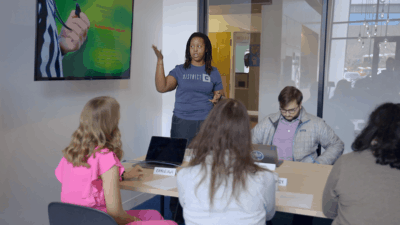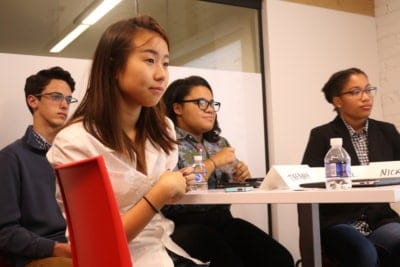

According to Harvard University, the Carnegie Foundation, and Stanford Research Center, 85% of job success comes from having well-developed soft skills, presentation skills, and problem solving skills. District C, a nonprofit organization in North Carolina, educates students in these exact areas through a unique education model.
Students that participate in the model are placed in teams and tasked with developing a solution for a complex problem proposed by a local business. In the process of solving the problem, they learn how to research and develop a solution and how to effectively communicate their solution proposals. In fact, 90% of business partners have implemented or plan to implement at least part of the solutions proposed by District C students.
I participated in the District C program as a senior in high school and found it very beneficial for developing skills for problem solving, networking, and presenting. I was on a team (named Squad 50) with one other student, but usually teams consist of four members from different grades and schools.
On the first day of the program, known as Launch Day, my partner and I learned a whole host of skills including how to successfully navigate problems in a group setting, how to effectively suggest ideas in a team, and how to properly question someone to find the root of a problem. Instead of naming all of the skills and giving away District C’s secret recipe, I’ll just tell you that every one of the skills we learned proved useful.
Right after this, Squad 50 was paired with Republic Wireless, which is a national mobile cellular service and phone seller based in Raleigh. We were tasked with designing a solution to increase their customer referrals. Using the skills we just learned, my partner and I interviewed a Republic Wireless employee to learn more about the problem we were working with.


For three and half weeks after Launch Day, Squad 50 met several times a week on Zoom to work on our solution. We presented our final idea at a pitch event to Republic Wireless employees. In fact, Republic Wireless liked the solution so much that they invited us back to pitch our idea to the rest of the company.
I was just one student out of more than 980 students who have had the chance to participate in District C’s model. Each student’s experience differs, but we have one thing in common: District C prepares us for the future and teaches us extremely influential strategies, including how to identify a team members’ strengths and weaknesses, digging to the root of the problem through effective questioning and finding the right resources, and looking at a problem from multiple perspectives to see potential pitfalls.
Through the experience of communicating with professionals at the local business and other group members, District C’s students will be more than prepared for networking and corresponding in their future careers. This experience also forges lasting friendships. My partner and I are very close friends. Even a year after participating in District C, we continue to stay in touch.
As students, we learned how to face a challenge, build a community, learn collaboration, practice communication, foster creativity, develop critical thinking, and form connections. These skills students are taught will aid them to solve the problems of today and build a better tomorrow. It’s my hope that someday, District C will grow and provide this sort of educational experience for all students across North Carolina.



